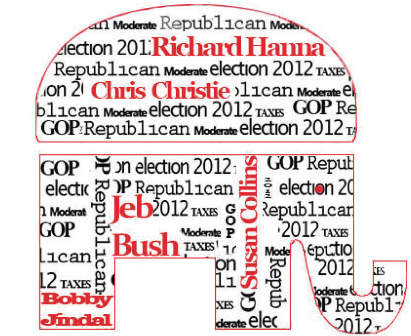staff editorial
Nearly $6 billion in campaign advertisements and more than a year of mudslinging tactics later, the presidential race did not produce much of a change in government; Barack Obama is still the president, the House of Representatives maintains its Republican majority, and the Senate remains Democratic. But with Obama’s landslide win of minority, youth and female votes, the GOP’s decreasing relevancy has become overwhelmingly apparent.

The derogatory and offensive public statements made by far-right politicians during the presidential race, in addition to the lack of moderate options for the Republican candidate, appear to have alienated many essential voter demographics away from the Republican Party.
“The far-right Republicans are backwards. They criticized Republicans who were closer to being in the middle, and because of their refusal to make compromises, the GOP looked disorganized,” said senior Victoria Giamboi.
In terms of true soul-searching, the Republicans have a lot of work to do. Obama won the youth, female and all minority votes (see statistics below) despite his weaknesses throughout the election year.
Many feel the behavior of certain Republicans-Todd Akin Richard Mourdock, and Rick Santorum just to name a few-has cultivated the GOP’s current image as an out-of-touch, ideological party; a reputation that allowed Obama to claim victory.
The 2012 Republican primaries began the onslaught of public embarrassments and ideological campaigning that marked the party’s decline of support. From Rick Perry’s anti-gay commercials and debate blunders to Michele Bachmann’s evangelical Tea Party agenda to Rick Santorum’s obsession with banning pornography, there was seemingly no hope for a strong presidential candidate. Mitt Romney’s eventual candidacy did little to change voters’ minds, as he progressively became a caricature of old-world conservatism.
“I hope the Republicans will change a little bit, because the world is changing more. If they don’t, then young people won’t support them and there won’t be a Republican Party,” said sophomore Liz Casserly.
In response to resounding criticism by both Democrats and Republicans, many moderate Republican politicians are advocating for a modernizing of the party’s message during this critical period following the election. Moderates such as New Jersey Governor Chris Christie, New York Congressmen Richard Hanna, and Louisiana Governor Bobby Jindal have all made stands against the extreme conservatism maligning the Republican Party.
“We’ve got to make sure that we are not the party of big business, big banks, big Wall Street bailouts, big corporate loopholes, big anything,” said Jindal to Politico, calling for Republicans to “stop being the stupid party.”
One recent attempt by the Republicans to modify their image by reaching out to immigrants is the ACHIEVE Act, sponsored by a group of senators from border states. However, unlike Obama’s proposed Dream Act, ACHIEVE, which is narrow in scope, does not offer a path to citizenship, and is therefore unlikely to attract Latino voters.
Despite all the party reshaping the Republicans will likely do over the next four years, President Obama may not have an easy time fighting the opposition and completing his legislative agenda. The first test for Obama during his second term will be avoiding the fiscal cliff, which would go into effect on January 1 and cause massive automatic spending cuts and tax increases that could send the US back into a recession.
While the most likely outcome of the cliff would be a deal with both sides unhappy and both sides shouldering the blame for poor economic conditions in the coming year, if a deal is never reached, the Republicans will most likely take the blame for the fallout.
One thing is clear though: if the Republicans want to take back the presidency, they must become a party for the 21st century and focus on bringing all Americans together for the purpose of protecting freedom.
GOP must moderate positions to reflect changing nation
January 2, 2013
